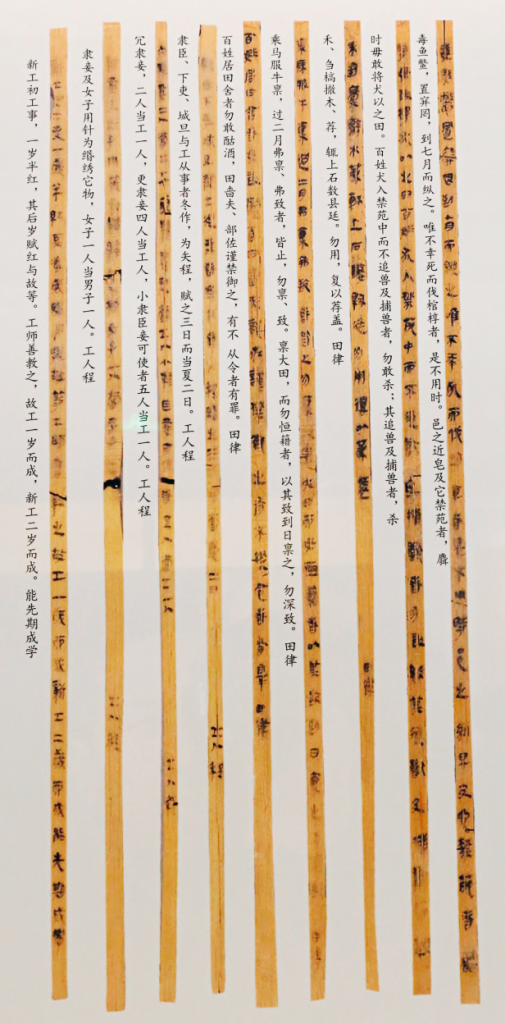In 1975, an extraordinary archaeological discovery was made in Yunmeng County, Hubei Province. A tomb was unearthed, revealing a fascinating scene where the deceased had been surrounded by bamboo slips. The tomb’s occupant, known only as “Xi,” was buried with these ancient documents surrounding him, even under his feet and beside his head. One of these bamboo slips, titled Chronicle of Events, read like a personal memoir and revealed that Xi was born in 262 BCE, two years older than the first Emperor of China, Qin Shi Huang. His tomb provides a unique window into life during the Qin Dynasty and its famously harsh legal system.

A Look Into the Punitive Laws of the Qin Dynasty
The Qin Dynasty, known for its military might and the unification of China, also had a notorious reputation for its brutal legal code. The Qin bamboo slips provide vivid details of the legal practices of the time. Offenses that seem trivial today, such as stealing a handful of mulberry leaves or a pig’s kidney worth less than a penny, were met with severe punishments. For example, the thief would be sentenced to thirty days of forced labor or even public humiliation, where his beard would be shaved off.
One of the most striking aspects of these ancient laws is their focus on the act itself, rather than the value of what was stolen. It wasn’t about how much someone stole, but the mere fact that they broke the law. Even minor infractions were punished with draconian measures, reflecting the authoritarian nature of the state.
The Qin Legal System: More Than Just Harsh Punishments
While the Qin legal system is often remembered for its severity, there were also provisions that reflected a more balanced approach. For instance, the law made allowances for minors, reducing their liability based on height (specifically, “less than six feet” in some records) when they were accused of crimes. There was also a notable effort to curb false accusations. Individuals who made baseless allegations were penalized, and anonymous tips were not taken seriously, emphasizing the importance of evidence and honesty in the judicial process.
One of the most unusual aspects of the Qin legal records is the acknowledgment of confessions. The Qin slips contain multiple examples of individuals who voluntarily confessed to crimes, which could lead to reduced sentences. This suggests that the Qin Dynasty valued cooperation, perhaps even as a method for streamlining justice during turbulent times.
Forensic Techniques: A Glimpse Into Ancient Crime Solving
The Qin slips also contained detailed accounts of criminal investigations, some of which resemble modern forensic practices. In one case, a murder investigation described the victim’s injuries in meticulous detail, from knife wounds on the chest to blood stains on the ground. The investigation followed a methodical process, with investigators questioning witnesses, examining physical evidence, and tracking down suspects in a manner remarkably similar to contemporary police work.
For example, the case of a woman who was attacked and robbed on her way home involved detailed questioning, the examination of a weapon, and a thorough search of suspects. The records even describe the tools used for the investigation, such as a nine-inch iron dagger. These ancient criminal procedures show that even thousands of years ago, the Qin Dynasty had a functional justice system, focusing on details and methodical inquiry.
Legal Contradictions: The Gap Between Law and Practice
However, like many ancient legal systems, the Qin law code was not always effectively enforced. The famous Shiji (Records of the Grand Historian) and other historical texts mention how local officials often ignored the law or applied it inconsistently. The reality of enforcing such a strict legal code led to corruption, false accusations, and even the wrongful execution of innocent people.
This gap between the written law and its enforcement can be seen in the way the Qin Dynasty eventually fell. Although it was founded on legal rigor, the over-reliance on harsh punishment and rigid rules led to widespread dissatisfaction. It wasn’t long before revolts broke out, culminating in the collapse of the Qin Dynasty after only 15 years of rule. This instability highlighted the dangers of a legal system that lacked flexibility and fairness in practice.
Qin’s Legacy: A Cautionary Tale for Future Generations
Despite its collapse, the Qin Dynasty’s legal practices had a lasting impact on Chinese law. After the fall of the Qin, the Han Dynasty adopted many of the Qin legal principles, but they also refined and softened them. The Han rulers took lessons from the Qin’s downfall and introduced a more balanced approach to justice, ensuring that the law was enforced more fairly and with greater consideration for human dignity.
Today, the Qin legal codes serve as a reminder of the importance of not only having laws in place but also ensuring that they are applied justly. While some aspects of the ancient system were clearly designed to maintain control and order, the legacy of the Qin Dynasty underscores the necessity of balancing law enforcement with compassion and fairness in governance.

No comments yet.